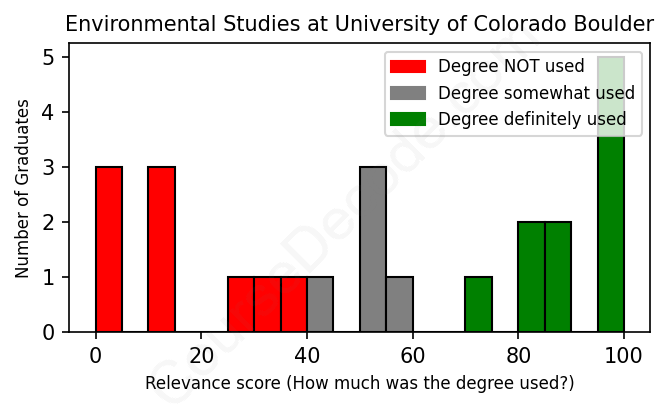
First, some facts. Of the Environmental Studies graduates from University of Colorado Boulder we've analyzed , here's how many have used (or NOT used) their degree in their career:

These are estimates based on AI analysis of 24 LinkedIn profiles (see below).
The verdict? Significantly below average. Overall, with an average relevance score of 53%, Environmental Studies graduates from University of Colorado Boulder have a much lower likelihood (-14%) of finding work in this field compared to the average graduate across all fields:
And for comparison, here's the chart for all profiles we've looked at across all degrees.
Also, after graduating, only 16% of these graduates have pursued further education other than another Bachelor's degree (such as a Masters degree or other), compared to the average across all profiles of 35%. This suggests a Bachelors degree is enough for most Environmental Studies graduates, and it's normal to look for work straight after graduation.
See the details:
|
Relevance score: 32% We think this person has NOT gone into a career related to their degree. We think this person has NOT gone into a career related to their degree.
DEGREE INFOGraduated in 2021 from University of Colorado Boulder with a Bachelor's degree in Environmental Studies. No other secondary education since. JOB HISTORY SINCE GRADUATIONGeneralist Adjuster SafeAuto Jul 2021 - Aug 2022 Underwriter  Ironshore Insurance Aug 2022 - Present ABOUTNo information provided. |
The top 10 most common jobs done by the graduates we've analyzed (ranked most common to least) are:
After analyzing the job trajectories of graduates from the University of Colorado Boulder with a degree in Environmental Studies, it's clear that there's a wide variety of positions they've taken up, but not all of them are closely related to their field of study. Many of the roles—like Yoga Instructors, bartenders, and managers in hospitality—tend to focus more on customer service or wellness rather than applying environmental knowledge. A significant number of graduates have gravitated toward roles in business management or unrelated fields like retail, which often doesn't tap into the core skills they learned during their studies.
However, there are also bright spots where graduates found their way into positions that are highly relevant to Environmental Studies. Roles such as Graduate Sustainability Consultants, Environmental Health Specialists, and positions in governmental bodies focusing on environmental policy showcase how some graduates are indeed putting their degree to good use. Jobs in sustainability consulting, ecological restoration, and even internships with environmental organizations highlight that while many may veer off into unrelated fields initially, there are also strong pathways that align closely with Environmental Studies, especially as they gain more experience and clarify their career goals. Ultimately, it appears that while there’s a significant amount of divergence into other sectors, there’s also a good chunk of graduates who are finding meaningful work within the environmental sphere, contributing to sustainable practices and conservation efforts.
Here is a visual representation of the most common words in job titles for Environmental Studies graduates (this is across all Environmental Studies graduates we've analyzed, not just those who went to University of Colorado Boulder):

Graduates from the University of Colorado Boulder with a degree in Environmental Studies seem to have diverse and varying career paths, especially in the early years after their degree. Many of them kickstart their careers with jobs that may not be directly tied to environmental issues, like positions in hospitality, retail, or coaching. For instance, some alumni took on roles such as yoga instructors, bar managers, and customer service positions shortly after graduating. However, as they accumulate experience, it appears that many do transition into more relevant positions that align with their studies, such as sustainability consultants, environmental health specialists, and project managers focused on ecological initiatives.
Fast forward about 5 to 10 years after graduation, and you can see a trend where graduates are landing more impactful roles in environmental sectors. Many have taken on positions like Sustainability Manager, Compliance Specialist, or Environmental Protection Specialist, showcasing a clear evolution in their careers toward more specialized roles that contribute positively to environmental causes. Overall, while some early career choices may stray from environmental work, there’s a noticeable shift toward fulfilling and relevant careers as they progress, leading to generally successful trajectories in the field of Environmental Studies.
Getting a Bachelor’s degree in Environmental Studies at the University of Colorado Boulder is definitely a mix of challenging and rewarding, like any college experience. It's not super easy—you're diving into topics like ecology, sustainability, and policy, so expect to do a fair amount of reading and critical thinking. Some students find the interdisciplinary nature of the program a bit tough because it pulls from various fields like science, social science, and even some economics. However, if you're passionate about the environment and enjoy group projects, discussions, and hands-on learning, you'll likely find it engaging and worthwhile. It might feel a bit easier if you love the subject matter, but overall, be ready to put in some solid effort to keep up!
Most commonly, in the LinkedIn profiles we've looked at, it takes people 4 years to finish a Bachelor degree in Environmental Studies.
So, looking at these Environmental Studies grads from CU Boulder, it seems like their earnings might be a mixed bag, but overall, a lot of them seem to be doing alright, especially as they gain more experience. Some started off with lower-paying jobs, like yoga instructors or bartenders, but many transitioned into roles that likely pay more, especially those working as consultants, managers, and in sales roles. The ones who went into government or larger companies seem to have more stability and potentially better salaries, like the ones in environmental protection and project management. It's typical for many grads to start slow and then work their way up, so while they might not be hitting it big right away, several are on paths that could lead to decent salaries as they progress in their careers.
Here is a visual representation of the most common words seen in the "about" section of LinkedIn profiles who have a Bachelor degree in Environmental Studies (this is across all Environmental Studies graduates we've analyzed, not just those who went to University of Colorado Boulder). This may or may not be useful:

Here are all colleges offering a Bachelor degree in Environmental Studies (ordered by the average relevance score of their Environmental Studies graduates, best to worst) where we have analyzed at least 10 of their graduates:
| College | Score | Count |
|---|---|---|
 California State University-Sacramento California State University-Sacramento
|
89 | 10 |
 University of Vermont University of Vermont
|
72 | 21 |
 University of California, Santa Barbara University of California, Santa Barbara
|
69 | 24 |
 University of California, Santa Cruz University of California, Santa Cruz
|
59 | 31 |
 Florida State University Florida State University
|
57 | 10 |
 University of Washington University of Washington
|
57 | 13 |
 UC Santa Barbara UC Santa Barbara
|
57 | 15 |
 University of Oregon University of Oregon
|
56 | 13 |
 University of Colorado Boulder University of Colorado Boulder
|
53 | 24 |